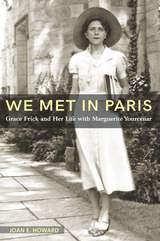7 books about Yourcenar, Marguerite

A Blue Tale and Other Stories
Marguerite Yourcenar
University of Chicago Press, 1995
This story collection is a welcome port of entry for any reader not yet familiar with Marguerite Yourcenar’s works.
Published to great acclaim in France in 1993, this collection is not only a delight for Marguerite Yourcenar fans but a welcome port of entry for any reader not yet familiar with the author's lengthier, more demanding works. This collection includes three stories written between 1927 and 1930 when the author was in her mid-twenties. These stories cover a range of themes, from an allegory on greed and a scene from the war of the sexes to a witch hunt that obsessively creates its own quarry.
For the devoted readers of Yourcenar, this collection allows a rare glimpse at the beginnings of a writer's craft. In these accomplished but forgotten pieces, edited and introduced by her biographer, Josyane Savigneau, readers will find the blend of fable and fairy tale of Oriental Tales, the psychological chronicle of Dear Departed, and the ironic realism of A Coin in Nine Hands. Read as an introduction to Yourcenar's work, the stories take us into the writer's workshop, as it were, to the early days of creation. A Blue Tale and Other Stories carries the unmistakable voice of a formidable and vastly talented writer.
Marguerite Yourcenar (her pseudonym was an anagram of her family name, Crayencour) was born in Brussels in 1903 and died in Maine in 1987. One of the most respected writers in the French language, she is best known as the author of the best-selling Memoirs of Hadrian and The Abyss. She was awarded many literary honors, most notably election to the Académie Francaise in 1980, the first woman to be so honored.
Published to great acclaim in France in 1993, this collection is not only a delight for Marguerite Yourcenar fans but a welcome port of entry for any reader not yet familiar with the author's lengthier, more demanding works. This collection includes three stories written between 1927 and 1930 when the author was in her mid-twenties. These stories cover a range of themes, from an allegory on greed and a scene from the war of the sexes to a witch hunt that obsessively creates its own quarry.
For the devoted readers of Yourcenar, this collection allows a rare glimpse at the beginnings of a writer's craft. In these accomplished but forgotten pieces, edited and introduced by her biographer, Josyane Savigneau, readers will find the blend of fable and fairy tale of Oriental Tales, the psychological chronicle of Dear Departed, and the ironic realism of A Coin in Nine Hands. Read as an introduction to Yourcenar's work, the stories take us into the writer's workshop, as it were, to the early days of creation. A Blue Tale and Other Stories carries the unmistakable voice of a formidable and vastly talented writer.
Marguerite Yourcenar (her pseudonym was an anagram of her family name, Crayencour) was born in Brussels in 1903 and died in Maine in 1987. One of the most respected writers in the French language, she is best known as the author of the best-selling Memoirs of Hadrian and The Abyss. She was awarded many literary honors, most notably election to the Académie Francaise in 1980, the first woman to be so honored.
[more]

A Coin in Nine Hands
A Novel
Marguerite Yourcenar
University of Chicago Press, 1994
During the space of a day in Rome in 1933, a ten-lira coin passes through the hands of nine people—including an aging artist, a prostitute, and a would-be assassin of Mussolini. The coin becomes the symbol of contact between human beings, each lost in private passions and nearly impenetrable solitude.
"A Coin in Nine Hands has . . . passages that move close to poetry and a story that belongs in both literature and history."—Doris Grumbach, Los Angeles Times Book Review
"What lingers at the end of A Coin in Nine Hands is the shadowiness and puppetlike vagueness of the Dictator, and the compelling specificity of the so-called 'common people' revolving all around him."—Anne Tyler, The New Republic
"Within a few pages we have met half the major characters in this haunting, brilliantly constructed novel. . . . The studied perfection, the structural intricacy and brevity remind one of Camus. Yet by comparison, Yourcenar's prose is lavish, emotional and imagistic."—Cynthia King, Houston Post
"Transcends its specific time and place to become a portrait of vividly delineated characters caught in the vise of a tragically familiar political situation."—Publisher's Weekly
Best known as the author of Memoirs of Hadrian and The Abyss, Marguerite Yourcenar (1903-87) achieved countless literary honors and was the first woman ever elected to the Académie Française.
"A Coin in Nine Hands has . . . passages that move close to poetry and a story that belongs in both literature and history."—Doris Grumbach, Los Angeles Times Book Review
"What lingers at the end of A Coin in Nine Hands is the shadowiness and puppetlike vagueness of the Dictator, and the compelling specificity of the so-called 'common people' revolving all around him."—Anne Tyler, The New Republic
"Within a few pages we have met half the major characters in this haunting, brilliantly constructed novel. . . . The studied perfection, the structural intricacy and brevity remind one of Camus. Yet by comparison, Yourcenar's prose is lavish, emotional and imagistic."—Cynthia King, Houston Post
"Transcends its specific time and place to become a portrait of vividly delineated characters caught in the vise of a tragically familiar political situation."—Publisher's Weekly
Best known as the author of Memoirs of Hadrian and The Abyss, Marguerite Yourcenar (1903-87) achieved countless literary honors and was the first woman ever elected to the Académie Française.
[more]

Fires
Marguerite Yourcenar
University of Chicago Press, 1994
Fires consists of nine monologues and narratives based on classical Greek stories. Antigone, Clytemnestra, Phaedo, Sappho are all mythical figures whose stories are mingled with contemporary themes. Interspersed are highly personal narratives, reflecting on a time of profound inner crisis in the author's life.
"The unwritten novel among the fantasies and aphorisms of Fires is a classic tale."—Stephen Koch, New York Times Book Review
"The unwritten novel among the fantasies and aphorisms of Fires is a classic tale."—Stephen Koch, New York Times Book Review
[more]

Marguerite Yourcenar
Inventing a Life
Josyane Savigneau
University of Chicago Press, 1993
Marguerite Yourcenar was born Marguerite de Crayencour in Brussels in 1903. She lost her mother at birth, her native Belgium at the age of six, and was forced to flee her adopted France at twelve. It is little wonder that Yourcenar, whose own early past receded so quickly into personal legend, would one day describe her writing as the "passionate reconstitution , at once detailed and free, of a moment or a man out of the past." One of the most respected writers in the French language, best known as the author of Memoirs of Hadrian and The Abyss, she was awarded countless literary honors, culminating with her election in 1980 to the Académie Française (she was the first woman ever to be so honored). As complex, erudite, and intriguing as her work, Yourcenar's life has resisted its own passionate reconstitution until now, in part because of the writer's deliberate elusiveness, even in her autobiographical trilogy.
Here, in its intricate and often contradictory detail, is Marguerite Yourcenar's story, one in which loss and learning intertwined almost from the first and in which love assumed a strangely paradoxical place. Drawing on letters, diaries, and interviews with Yourcenar's friends, colleagues, and lovers, Josyane Savigneau's biography paints an intimate portrait of an artist who lived according to her own, occasionally contrary, terms: a Frenchwoman ardently in love with her native tongue, yet who lived half her life in New England; an avid seductress of women, who spent nearly forty years with one woman, yet fell in love early and late in her life with two young men; a powerful female writer whose most memorable protagonists were male, from Alexis of her first novel to the later historical characters Hadrian and Zeno. Savigneau weaves these and other contraries of Yourcenar's life into a vibrant and engrossing pattern.
Editor of "Le Monde des Livres," the literary pages of France's most influential newspaper, Savigneau first met Marguerite Yourcenar on assignment in 1984. What began as a professional relationship gradually turned into a friendship. Her personal insights into that life enrich this exhaustively documented text. Following the lead set by Yourcenar in her memoir Dear Departed, the biographer found herself "searching for a truth that is multiple, unstable, evasive, sometimes saddening, and at first glance scandalous but that one cannot approach without often feeling for human beings in all their frailty a certain measure of kinship and, always, a sense of pity." Yourcenar's profound intelligence and sympathy, her foibles and obsessions, her accomplishments and trials: all are revealed here in an uncompromising portrait of an incomparable artist.
Here, in its intricate and often contradictory detail, is Marguerite Yourcenar's story, one in which loss and learning intertwined almost from the first and in which love assumed a strangely paradoxical place. Drawing on letters, diaries, and interviews with Yourcenar's friends, colleagues, and lovers, Josyane Savigneau's biography paints an intimate portrait of an artist who lived according to her own, occasionally contrary, terms: a Frenchwoman ardently in love with her native tongue, yet who lived half her life in New England; an avid seductress of women, who spent nearly forty years with one woman, yet fell in love early and late in her life with two young men; a powerful female writer whose most memorable protagonists were male, from Alexis of her first novel to the later historical characters Hadrian and Zeno. Savigneau weaves these and other contraries of Yourcenar's life into a vibrant and engrossing pattern.
Editor of "Le Monde des Livres," the literary pages of France's most influential newspaper, Savigneau first met Marguerite Yourcenar on assignment in 1984. What began as a professional relationship gradually turned into a friendship. Her personal insights into that life enrich this exhaustively documented text. Following the lead set by Yourcenar in her memoir Dear Departed, the biographer found herself "searching for a truth that is multiple, unstable, evasive, sometimes saddening, and at first glance scandalous but that one cannot approach without often feeling for human beings in all their frailty a certain measure of kinship and, always, a sense of pity." Yourcenar's profound intelligence and sympathy, her foibles and obsessions, her accomplishments and trials: all are revealed here in an uncompromising portrait of an incomparable artist.
[more]

Mishima
A Vision of the Void
Maguerite Yourcenar
University of Chicago Press, 2001
On November 25, 1970, Japan's most renowned postwar novelist, Yukio Mishima, stunned the world by committing ritual suicide. Here, Marguerite Yourcenar, a brilliant reader of Mishima and a scholar with an eye for the cultural roles of fiction, unravels the author's life and politics: his affection for Western culture, his family and his homosexuality, his brilliant writings, and his carefully premeditated death.
[more]

Two Lives and a Dream
Marguerite Yourcenar
University of Chicago Press, 1994
Set in Rembrandt's Amsterdam, "An Obscure Man" is the story of Nathanaël—innocent, open to experience—born like Everyman upon the stream of life. In "A Lovely Morning," Nathanaël's young son joins a touring company of Jacobean actors. "Anna, soror . . . ," the final tale, is an account of illicit passion in the baroque world of Naples.
"An Obscure Man swarms with life. This intricately researched, imaginative, beautifully written tale of a young man's brief life in the mid-17th century is entirely engrossing."—Leona Weiss, San Francisco Chronicle
"In these three stories, [Yourcenar] succeeds in making the essences of these past lives a part of the reader's future through the sheer intensity of their portrayal."—Margaret Ezell, Houston Chronicle
"An Obscure Man swarms with life. This intricately researched, imaginative, beautifully written tale of a young man's brief life in the mid-17th century is entirely engrossing."—Leona Weiss, San Francisco Chronicle
"In these three stories, [Yourcenar] succeeds in making the essences of these past lives a part of the reader's future through the sheer intensity of their portrayal."—Margaret Ezell, Houston Chronicle
[more]

"We Met in Paris"
Grace Frick and Her Life with Marguerite Yourcenar
Joan E. Howard
University of Missouri Press, 2020
Grace Frick introduced English-language readers all over the world to the distinguished French author Marguerite Yourcenar with her award-winning translation of Yourcenar’s novel Memoirs of Hadrian in 1954. European biographies of Yourcenar have often disparaged Frick and her relationship with Yourcenar, however. This work shows Frick as a person of substance in her own right, and paints a portrait of both women that is at once intimate and scrupulously documented. It contains a great deal of new information that will disrupt long-held beliefs about Yourcenar and may even shock some of her scholars and fans.
[more]
READERS
Browse our collection.
PUBLISHERS
See BiblioVault's publisher services.
STUDENT SERVICES
Files for college accessibility offices.
UChicago Accessibility Resources
home | accessibility | search | about | contact us
BiblioVault ® 2001 - 2024
The University of Chicago Press









